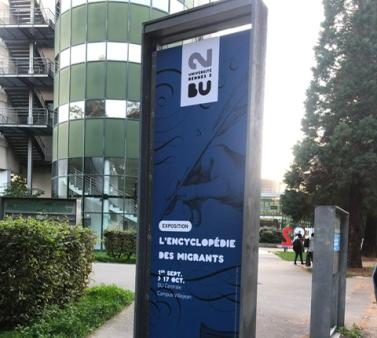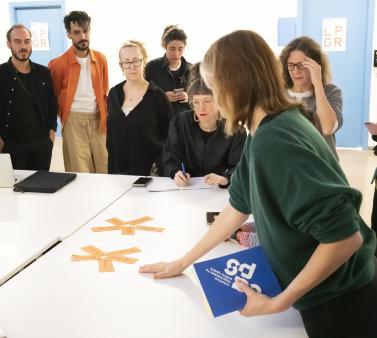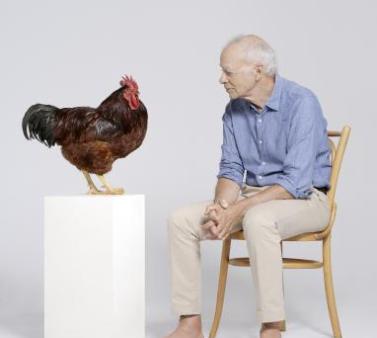Creative Approaches to Public Space (CAPS)
CAPS focuses on innovative, creative ways of experimenting in academic research, teaching and action, all within public space. The aim is to combine creative imagination, critical thinking, and interdisciplinary collaboration. With several local and international partnerships, CAPS seeks to create new encounters with publics from within the university environment, and outside of it. Their goal is to play an active role in society, with creativity at the centre of their actions.
CAPS thinks about public space with practice-based research in mind, and also as a way of working with civil society to create things (objects, art works, performances), whilst engaging with different publics and experts. CAPS thrives on interdisciplinarity, and involves collaboration between several university departments – such as Geography and Urban Planning, Arts, Information Communication, Sociology and Languages – as well as close cooperation with Rennes’ top art and architecture institutions.

Partnerships and Networks
Developed by Rennes 2 University, the CAPS Graduate School is being created in partnership with the Ecole européenne d’art de Bretagne (EESAB), and the Ecole nationale supérieure d’architecture de Bretagne (ENSAB). CAPS is supported by the French National Research Agency, the Brittany Regional Council, Rennes Metropole and Ville de Rennes.
It is supported by the CNRS and the Maison des Sciences de l'Homme en Bretagne and is associated with two Scientific Interest Groups - l'Institut d’Aménagement et d’Urbanisme de Rennes and les Archives de la Critique d’Art - and with the international network Creative Shift Studies.
Internationally, CAPS has partnerships with:
- University of Barcelona, Spain; Queen's University, UK; University College Cork, Ireland; The IADT /Institute of Art Design and Technology, Ireland; Goldsmiths University of London, UK; Leuphana University, Germany; KHiO Oslo National Academy of the Arts, Norway; University of Arts, Poland; Bauhaus University Germany; Concordia University, Canada; Texas State University, USA; Swinburne University of Technology, Australia.
Upcoming Key Dates:
April 2021 - International Board Meeting
September 2021 - the first CAPS-funded doctorates will begin.
September 2022 - launch of the open-MA programme.
More information on this new interdisciplinary graduate school will be coming soon and information is also available on their website here.
DIGISPORT Graduate School
DIGISPORT (Digital Sport Sciences) offers a comprehensive, hybrid graduate school encompassing the specialties in both sport and digital sciences. It provides excellence in research and teaching by serving both traditional students and industry professionals, as well as offering formal collaborations with regional research centers. DIGISPORT helps advance the use and efficacy of digital technologies in sports and exercise, impacting all stakeholders from the users, educators, clinical practitioners, managers, and actors in the socioeconomic world.
From the master's to the doctoral level, the program aims to offer students in initial and continuing training an opportunity to build a study strategy suited to their professional goals and to the labor market. Students build their own learning path through a modular teaching offer, based on pedagogical innovation, hybridization of student populations and interdisciplinary projects. The high-level technological platforms are great training tools. DIGISPORT will host renowned international researchers for its teaching programs.
International students can apply for academic mobility at the Graduate School during their MSc and PhD. Selected DIGISPORT students will have access to fellowships to support their international mobility.
Environment and Partners
The Rennes ecosystem is particularly well suited to host the DIGISPORT Graduate School, both in research and education and training. It incorporates world-class research units in the field of sport (top 300 in the Shanghai ranking), digital (top 100 in the Reuters ranking of the most innovative universities in Europe and top 300 medical technologies in the Shanghai ranking) but also electronics (top 200 for the Shanghai telecommunications ranking) and human and social sciences.
The research units involved in DIGISPORT are affiliated with CNRS joint labs (IRISA, IETR, IRMAR, CREST), Inria teams, Grandes Ecoles network (ENS Rennes, INSA Rennes, CentraleSupelec, ENSAI) and Université de Rennes 1 and Université Rennes 2. Rennes is also a proven socioeconomic incubator with a large network of companies organized around the Images et Réseaux cluster, French Tech-Le Poool and prominent sport institutions (CROS, Campus Sport Bretagne).
Read more about this innovative new program on their website.





